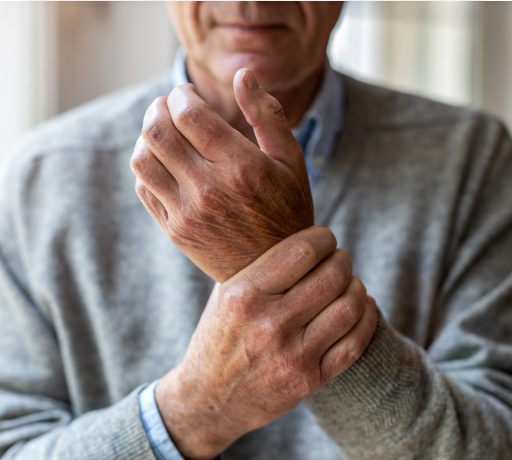
May is Osteoporosis Awareness and Prevention Month, a time to focus on a disease that can silently weaken your bones. At Hopscotch Primary Care, we care deeply about helping seniors stay active, independent, and informed. In this blog post, you’ll learn what osteoporosis is, why it matters, and how you can keep your bones strong and healthy.
What Is Osteoporosis?
Osteoporosis is a disease that makes your bones thin, weak, and more likely to break. It often happens as people get older, especially after age 50. When you have osteoporosis, a small fall or even a bump can cause a bone to break.
The bones that break most often are in the hip, spine, and wrist. These breaks can be very painful and may take a long time to heal. Sometimes, they even change a person’s life forever.
“Fractures aren’t just painful. They can keep you in the hospital, cost a lot of money, and make it harder to live on your own,” says Dr. Paul Fletcher, a provider at our Marion, NC clinic.
How Common Is Osteoporosis?
- About 1 in 2 women and 1 in 5 men over age 50 will break a bone because of osteoporosis.
- Every 20 minutes, an older adult in the U.S. dies because of a fall or a fall-related injury.
- After a hip fracture, some seniors may have a 30% chance of dying within a year.
You may not know you have osteoporosis until you break a bone. That’s why it’s sometimes called a “silent disease.”
What’s the Difference Between Osteoporosis and Osteoarthritis?
It’s easy to mix up osteoporosis with osteoarthritis, but they are not the same:
- Osteoporosis means your bones are weak.
- Osteoarthritis means your joints hurt and may be swollen.
Both are common as people get older, but they are treated differently.
How Do You Know If You Have Osteoporosis?
Doctors use a special test called a DEXA scan to check your bone strength. It compares your bone density to that of a healthy young adult. The results show if you have:
- Normal bone density
- Osteopenia (low bone mass)
- Osteoporosis (very low bone mass)
Ask your doctor if you should get a DEXA scan, especially if you are over 65 or have risk factors like family history or past fractures.
What Causes Bones to Get Weak?
Many things can make your bones weaker:
- Getting older
- Not getting enough calcium or vitamin D
- Not being active
- Smoking or drinking too much alcohol
- Taking certain medicines
Sometimes, it runs in families. That means if your parents had weak bones, you might too.
How Can You Make Your Bones Stronger?
You can take steps to protect your bones and lower your risk of fractures:
- Eat Bone-Healthy Foods
- Get calcium from dairy, leafy greens, or fortified foods.
- Get vitamin D from sunlight, fish, eggs, or supplements.
Most adults over 50 need about 1,200 mg of calcium and 800 IU of vitamin D each day.
Learn more about nutrition and bone health.
- Stay Active
Exercise helps build and keep strong bones. Try:
- Walking or dancing
- Lifting light weights
- Yoga or Tai Chi for balance
Strong muscles help support your bones and prevent falls.
- Prevent Falls
Dr. Fletcher reminds us, “Stopping falls is one of the most important ways to protect older adults with weak bones.”
To stay safe:
- Keep floors clear at home
- Use grab bars in the bathroom
- Wear shoes that don’t slip
- Use a cane or walker if needed
- Consider a medical alert device
Visit the CDC’s Fall Prevention page for more tips.
- Talk About Medication
Some people may need medicine to slow bone loss. Dr. Fletcher often prescribes medications like Fosamax, Boniva, Reclast, or Prolia. These can help prevent broken bones.
“People worry about side effects, but often the benefit of protecting your bones is worth it,” says Dr. Fletcher.
Final Thoughts
You can’t see or feel your bones getting weaker, but that doesn’t mean it’s not happening. If you’re over 65, talk to your provider about bone health. It could help you stay active and independent for many more years.
At Hopscotch Primary Care, we’re here to support you. Call us or visit hellohopscotch.com to schedule an appointment, ask about a DEXA scan, or get help managing your bone health.
Let’s stand strong together—this month and always.

